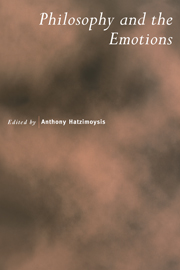Book contents
- Frontmatter
- Contents
- Preface
- Notes on Contributors
- I Emotions, Thoughts and Feelings: What is a ‘Cognitive Theory’ of the Emotions and Does it Neglect Affectivity?
- II The Emotions and their Philosophy of Mind
- III Basic Emotions, Complex Emotions, Machiavellian Emotions
- IV Emotion, Psychosemantics, and Embodied Appraisals
- V Emotions and the Problem of Other Minds
- VI Emotional Feelings and Intentionalism
- VII Emotions, Rationality, and Mind/Body
- VIII The significance of recalcitrant emotion (or, anti-quasijudgmentalism)
- IX The Logic of Emotions
- X Emotion and Desire in Self-Deception
- XI Emotion, Weakness of Will, and the Normative Conception of Agency
- XII Narrative and Perspective; Values and Appropriate Emotions
- XIII Passion and Politics
- XIV Don't Worry, Feel Guilty
- Index
IX - The Logic of Emotions
Published online by Cambridge University Press: 06 January 2010
- Frontmatter
- Contents
- Preface
- Notes on Contributors
- I Emotions, Thoughts and Feelings: What is a ‘Cognitive Theory’ of the Emotions and Does it Neglect Affectivity?
- II The Emotions and their Philosophy of Mind
- III Basic Emotions, Complex Emotions, Machiavellian Emotions
- IV Emotion, Psychosemantics, and Embodied Appraisals
- V Emotions and the Problem of Other Minds
- VI Emotional Feelings and Intentionalism
- VII Emotions, Rationality, and Mind/Body
- VIII The significance of recalcitrant emotion (or, anti-quasijudgmentalism)
- IX The Logic of Emotions
- X Emotion and Desire in Self-Deception
- XI Emotion, Weakness of Will, and the Normative Conception of Agency
- XII Narrative and Perspective; Values and Appropriate Emotions
- XIII Passion and Politics
- XIV Don't Worry, Feel Guilty
- Index
Summary
The issue of whether emotions are rational (or intelligent) is at the centre of philosophical and psychological discussions. I believe that emotions are rational, but that they follow different principles to those of intellectual reasoning. The purpose of this paper is to reveal the unique logic of emotions. I begin by suggesting that we should conceive of emotions as a general mode of the mental system; other modes are the perceptual and intellectual modes. One feature distinguishing one mode from another is the logical principles underlying its information processing mechanism. Before describing these principles, I clarify the notion of ‘rationality,’ arguing that in an important sense emotions can be rational.
Emotion as a general mode of the mental system
It is beyond the scope of this paper to discuss the nature of emotions, but I must mention a few aspects regarding this in order to clarify claims concerning the logic of emotions.
An emotion is not a mental state, such as hearing a noise or having a toothache; nor is it a mere disposition, as are beliefs and desires. An emotion is also not a capacity, as are sensation, perception, memory, imagination, and thought; nor is it an intentional mode of reference, as are cognition, evaluation and motivation. It is also not a mere feeling, as is a thrill.
I have suggested that an emotion is a general mental mode of the mental system. A general mental mode includes various mental elements and expresses a dynamic functioning arrangement of the mental system.
- Type
- Chapter
- Information
- Philosophy and the Emotions , pp. 147 - 162Publisher: Cambridge University PressPrint publication year: 2003
- 2
- Cited by

